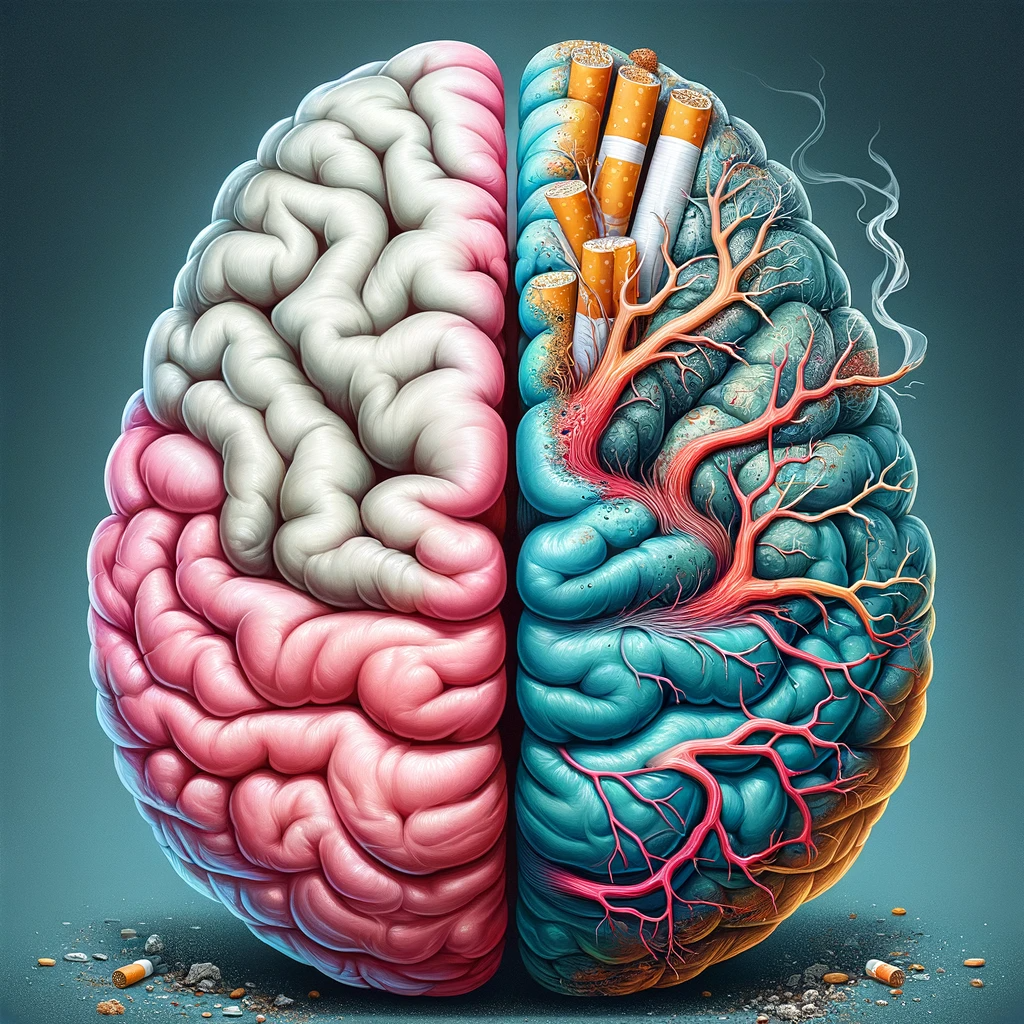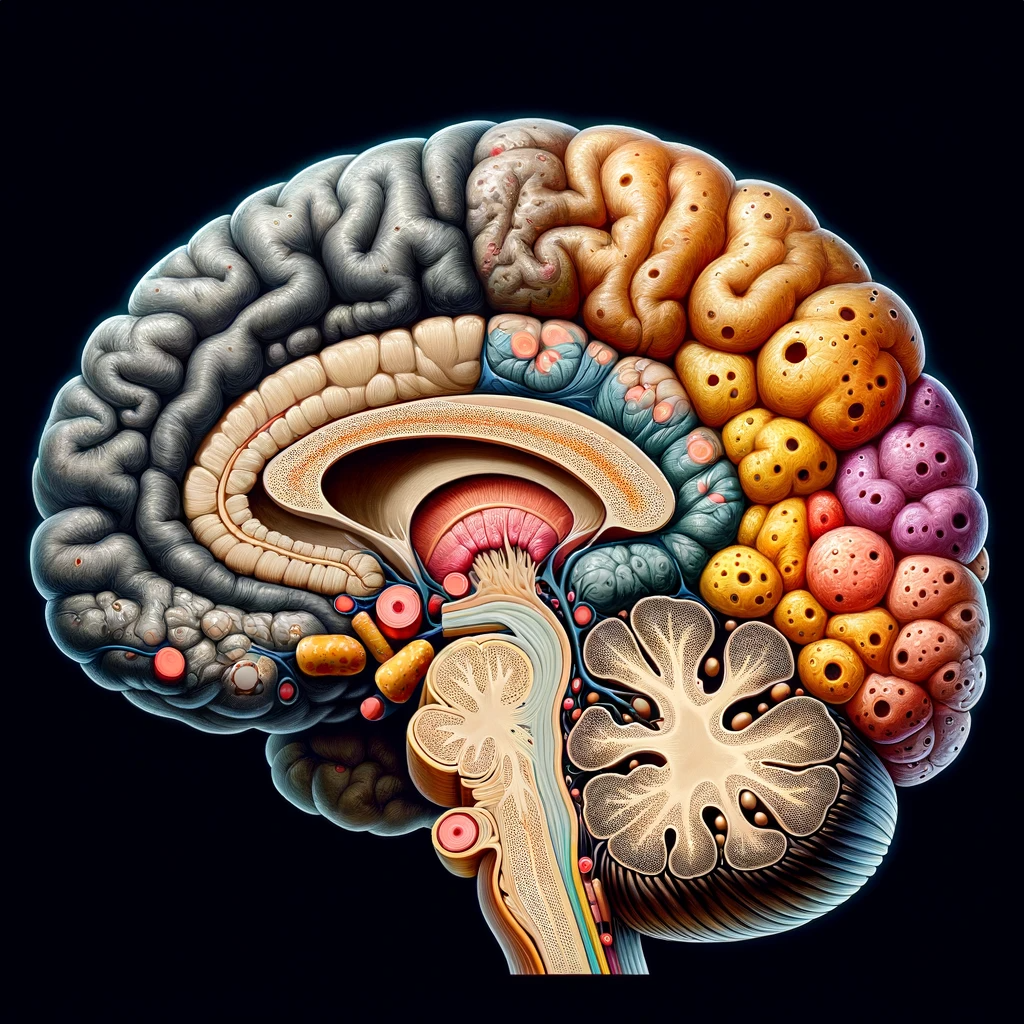
Have you ever wondered how smoking affects your brain?
The effects of smoking on the brain are complex and far-reaching, impacting everything from cognition to emotional regulation.
In this article, we’ll explore how the smoker’s brain differs from the normal, non-smoking brain, and how these differences can have a significant impact on overall brain function and health.
Understanding these differences is crucial for making informed decisions about smoking and its potential effects on your brain.
One of the most significant differences between the smoker’s brain and the normal brain is the effect of nicotine. Nicotine, the addictive substance in tobacco, acts on the brain’s reward system, flooding it with feel-good chemicals like dopamine.
Over time, the brain becomes reliant on nicotine to feel good, leading to addiction. Additionally, nicotine can also constrict blood vessels in the brain, reducing the flow of oxygen and nutrients to brain cells.
This can impair cognitive function and increase the risk of stroke.
Aside from nicotine, smoking also exposes the brain to a range of harmful chemicals and toxins, including carbon monoxide.
These substances can cause oxidative stress and inflammation in the brain, leading to damage to the neurons and potentially contributing to cognitive decline.
Furthermore, smoking has been linked to an increased risk of anxiety, depression, and other mental health issues, further highlighting the impact on brain function and emotional well-being.
Key Takeaways:
- Changes in brain structure: Smoking can lead to physical changes in the brain, including a smaller prefrontal cortex and a thinner cortex in certain regions. These changes can affect decision-making, impulse control, and cognitive function.
- Altered brain function: Smokers may experience altered brain function, particularly in areas related to reward processing and craving. This can contribute to addiction and make it difficult to quit smoking.
- Increased risk of mental health issues: Smokers have a higher risk of developing mental health issues such as anxiety, depression, and schizophrenia. These conditions can further impact brain function and overall well-being.
After years of research and scientific studies, it has become clear that smoking can have a profound impact on the brain. These changes can affect various aspects of brain structure and function, leading to consequences that can impact a person’s overall health and well-being.

Sometimes quitting can be really tough and now you can find the reason.
Take our FREE assessment and find out what is holding you back from quitting smoking in just 60 seconds.
One of the most significant differences between a smoker’s brain and a non-smoker’s brain is the physical changes that occur.
Studies have shown that long-term smoking can lead to a smaller prefrontal cortex, the area of the brain responsible for decision-making and impulse control.
Additionally, certain regions of the cortex may become thinner in smokers, which can affect cognitive function. Furthermore, smoking can also lead to altered brain function, particularly in areas related to reward processing and craving.
This can contribute to addiction and make it difficult for smokers to quit, as the brain becomes wired to seek out the pleasurable effects of nicotine. In addition to these changes, smokers also have an increased risk of developing mental health issues such as anxiety, depression, and schizophrenia.
These conditions can further impact brain function and overall well-being, creating a cycle that can be difficult to break. Overall, the smoker’s brain is different from the normal brain in several significant ways.
Understanding these differences can help highlight the importance of quitting smoking and the potential long-term effects of tobacco use on the brain.
The Science of Addiction
Some people may not realize that nicotine, the addictive substance in tobacco, can physically change your brain. Studies have shown that nicotine can cause changes in the brain that make you more susceptible to addiction, making it harder to quit smoking.
According to the Biological basis of tobacco addiction: Implications for …, these changes affect the brain’s reward system, making you more likely to seek out and use nicotine, even if you know it’s harmful to you.
Understanding Nicotine
Nicotine is a chemical found in tobacco products, including cigarettes, cigars, and chewing tobacco. When you inhale or ingest nicotine, it enters your bloodstream and travels to your brain, where it binds to specific receptors responsible for releasing dopamine, a neurotransmitter associated with pleasure and reward.
This is why smoking can make you feel good and can become addictive.
How Nicotine Affects the Brain
Once nicotine binds to the receptors in your brain, it triggers the release of dopamine, which creates a feeling of pleasure and reinforces the desire to continue using nicotine.
Over time, your brain adjusts to the increased dopamine levels caused by nicotine, leading to the development of tolerance. This means that you need more nicotine to achieve the same pleasurable effects, making it harder to quit.
Addiction Pathways in the Brain
The brain’s reward pathway, which is responsible for reinforcing behaviors that are essential for survival, becomes hijacked by nicotine. As a result, your brain starts associating smoking with pleasure, and you may experience cravings when you try to quit.
Additionally, long-term exposure to nicotine can alter the structure and function of key brain regions involved in decision-making, impulse control, and learning, leading to further difficulties in quitting smoking.
Structural and Functional Differences
For smokers, the structural and functional differences in the brain are a cause for concern. According to the American Chemical Society, smoking and vaping have been found to have a direct impact on the brain’s structure and function.
You can find more information on this in the Answers to Reading Comprehension Questions & Graphics.
Structural Changes in the Smoker’s Brain

When you smoke, the structure of your brain changes due to the harmful effects of nicotine and other chemicals. These alterations are particularly concerning because they can lead to long-term damage and increase the risk of developing conditions such as dementia and Alzheimer’s disease.
The brain’s gray matter, responsible for decision-making and impulse control, is adversely affected, leading to difficulties in managing cravings and making rational decisions.
Brain Function Alterations
Smoking also impacts your brain’s function, affecting your ability to concentrate, process information, and make decisions. The nicotine in cigarettes stimulates the release of dopamine, a neurotransmitter associated with pleasure and reward.
However, over time, your brain becomes less responsive to dopamine, leading to a need for more nicotine to achieve the same effect. This can result in addiction and dependency on cigarettes, making it challenging to quit.
The Impact on Cognitive Abilities
The cognitive abilities of smokers are significantly affected by their habit. Your memory, attention span, and learning capabilities are all impaired by smoking. This can have a detrimental effect on your performance at work or in school, as well as your overall quality of life.
Furthermore, smoking has been linked to an increased risk of developing mental health conditions such as depression and anxiety, further exacerbating the impact on your cognitive abilities and emotional well-being.
Overall, the structural and functional differences in the smoker’s brain can have severe consequences for your health and well-being. It is essential to be aware of these effects and consider seeking support to quit smoking.
Your brain is a vital organ, and protecting it from the harmful effects of smoking is crucial for maintaining your overall health and cognitive function.
The Effects of Smoking on Mental Health

Keep in mind that smoking can have a significant impact on your mental health. According to the Centers for Disease Control and Prevention, quitting smoking is hard because of the addiction to nicotine, which affects the brain and leads to withdrawal symptoms when you try to quit.
Depression and Anxiety in Smokers
Smoking can contribute to the development of depression and anxiety. Research has shown that smokers are more likely to experience symptoms of depression and anxiety compared to non-smokers. Nicotine affects the neurotransmitters in your brain, which can lead to mood disturbances.
If you are a smoker experiencing symptoms of depression or anxiety, quitting smoking may have a positive impact on your mental well-being.
Smoking and Stress Response
When you smoke, the nicotine in cigarettes can temporarily reduce stress and anxiety. However, smoking actually increases your overall stress levels in the long run.
Nicotine addiction leads to withdrawal symptoms that can increase feelings of stress and anxiety.
Additionally, the overall impact of smoking on your physical health can contribute to chronic stress. Quitting smoking can help regulate your body’s stress response and improve your overall mental well-being.
Recovery and Rehabilitation
Not all hope is lost if you have been a long-term smoker. Your brain can recover and rehabilitate, especially if you are committed to making a change.
The brain is a remarkably adaptable organ, and with the right steps, you can see improvements in your brain function and overall health.
The Plasticity of the Brain
The good news is that your brain has a quality known as plasticity, which means it can reorganize itself by forming new connections between brain cells.
When you quit smoking, your brain begins to repair itself, and over time, you can experience improvements in cognitive function and mental clarity. However, it’s important to remember that this process takes time, and it requires a commitment to avoiding tobacco use.
By staying away from cigarettes, you are allowing your brain to heal and rewire itself for the better.
Strategies for Quitting
Quitting smoking is not easy, but it is certainly achievable. There are various strategies and resources available to help you kick the habit, from nicotine replacement therapies to support groups and counseling.
Finding the right approach for you is crucial, and it may involve a combination of methods to effectively manage cravings and withdrawal symptoms. Remember, the first step to recovery is acknowledging that you need to make a change.
Once you have decided to quit, you are already on the path to a healthier brain and body.
Improvements After Smoking Cessation
Once you stop smoking, your body and brain start to experience positive changes almost immediately. Your blood pressure and heart rate decrease, improving your overall cardiovascular health.
Within a few days, your sense of taste and smell may begin to enhance, and you may feel more energetic. Over time, the risk of stroke and other smoking-related health problems diminishes, and your lung function can improve significantly.
By breaking free from the grip of smoking, you are allowing your brain to thrive and function at its best.
Conclusion
Upon reflecting on the differences between a smoker’s brain and a normal brain, it becomes evident that smoking has a profound impact on brain function.
The nicotine in cigarettes affects the levels of dopamine in the brain, altering your mood, behavior, and overall mental health. Additionally, smoking can lead to reduced cognitive function, impaired memory, and an increased risk of developing neurological disorders such as Alzheimer’s disease.
Understanding these differences is crucial in recognizing the detrimental effects of smoking on the brain and making informed decisions about your health.
FAQ
Smoking can lead to structural and functional changes in the brain. It can affect the dopamine system, which is responsible for pleasure and reward, as well as the prefrontal cortex, which is involved in decision-making and impulse control.
Chronic smoking can impair cognitive function, leading to difficulties with memory, attention, and learning. This can impact a smoker’s ability to perform daily tasks and can also increase the risk of developing conditions such as dementia.
Yes, smoking can lead to nicotine addiction, which is characterized by the brain’s dependence on nicotine to function normally. This can make it difficult for smokers to quit, as their brain has become accustomed to the presence of nicotine.
Long-term smoking can contribute to the development of neurological conditions such as stroke, Alzheimer’s disease, and Parkinson’s disease. It can also increase the risk of mental health disorders, such as anxiety and depression.
Quitting smoking can lead to improvements in brain function and structure. Research suggests that certain changes in the brain, such as the reduction in the size of the prefrontal cortex, may be reversible after smoking cessation. However, the extent of recovery may vary depending on factors such as the duration and intensity of smoking.
